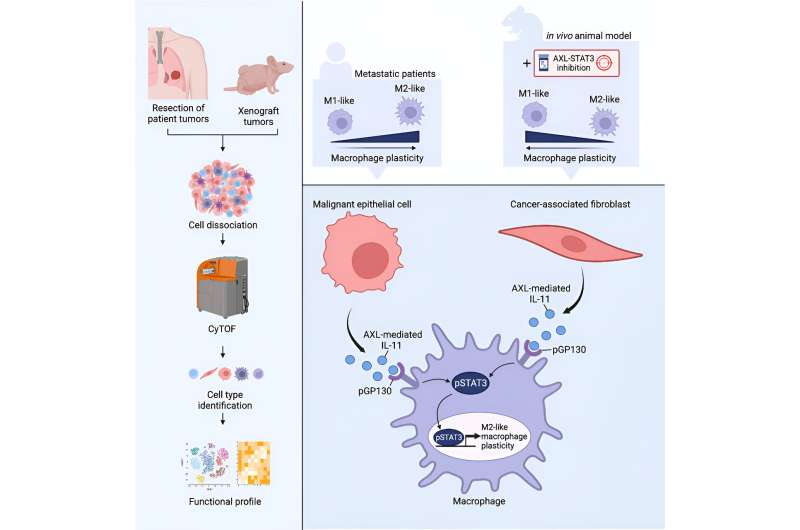This article has been reviewed according to Science X's editorial process and policies. Editors have highlighted the following attributes while ensuring the content's credibility:
fact-checked
peer-reviewed publication
trusted source
proofread
Possible markers identified for early metastatic lung cancer

Researchers at Mays Cancer Center at The University of Texas Health Science at San Antonio (UT Health San Antonio) have identified protein markers that could signal for early development of metastatic lung cancer, providing possibilities for a new treatment.
The findings have led to grant that will pave the way for a clinical trial next year for patients with advanced lung cancer. The research is detailed in an article in Cell Reports.
"For the trial, we will be looking to recruit patients with lung adenocarcinoma, the most common primary lung cancer in the United States, and particularly those with a refractory condition for which treatment hasn't been effective," said Josephine A. Taverna, MD, a faculty member in hematology and oncology with the Mays Cancer Center at UT Health San Antonio, and principal investigator of the NCI/NIH grant.
She also is a lead author of the Cell Reports article titled, "AXL-initiated paracrine activation of pSTAT3 enhances mesenchymal and vasculogenic supportive features of tumor-associated macrophages," along with Tim Hui-Ming Huang, Ph.D., professor and chair of the Department of Molecular Medicine at UT Health San Antonio and deputy director of Mays Cancer Center.
They are joined by a team of clinical investigators at Mays Cancer Center and faculty in the departments of molecular medicine, cardiothoracic surgery, pulmonology, population health sciences and biostatistics at UT Health San Antonio, along with The University of Texas MD Anderson Cancer Center in Houston and industry partners BerGenBio and Sobi.
Tumor-associated macrophages are types of white blood cells that in dysfunctional form are integral to the development of complex tumor microenvironments, or ecosystems, promoting tumor growth, invasion, metastasis and drug resistance. Signaling of these macrophages early on for lung cancer has been elusive.
However, the research by Taverna and her colleagues indicates that certain proteins known as AXL and STAT3 together transmit signals that appear in more advanced stages of lung cancer. This signaling in tumor-associated macrophages is triggered by lung cancer cells and cancer-associated cells.
"These findings suggest the potential application of AXL-STAT3-related markers to quantitatively assess metastatic potential and inform therapeutic strategies in lung cancer," Taverna said. "It provides a therapeutic rationale for targeting this network."
The researchers derived their results by conducting single-cell proteomic profiling of 15 lung tumors from 13 patients with lung adenocarcinoma, one patient with squamous cell lung cancer and one patient with pleiomorphic carcinoma. They found predominant and consistent AXL-STAT3 signaling in tumor and other cancer-related cells.
"Our initial observation suggests that concomitantly high AXL/STAT3 signaling in tumor-associated macrophages may contribute to the conditioning of pro-metastatic niches," Taverna said.
"Our experiments in the lab suggest that targeting the AXL-STAT3 pathway can prevent tumor cells from recruiting tumor-associated macrophages and other aggressive host cells into the tumor microenvironment, thereby inhibiting tumor growth and spread."
More information: Chia-Nung Hung et al, AXL-initiated paracrine activation of pSTAT3 enhances mesenchymal and vasculogenic supportive features of tumor-associated macrophages, Cell Reports (2023). DOI: 10.1016/j.celrep.2023.113067




















